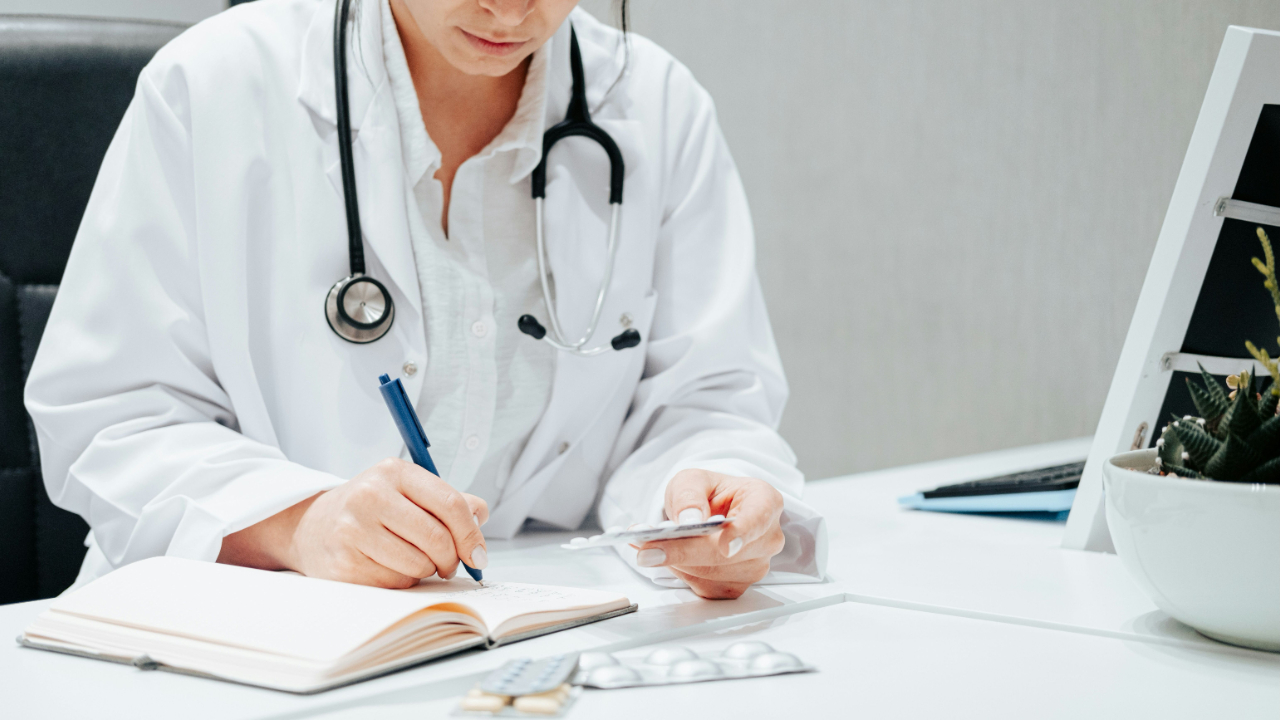What to Look for in a Doctor Who Prescribes GLP-1s Responsibly

Ever since I began discussing the concept of microdosing GLP1 agonists, I’ve been asked one question over and over again, “How do you find a physician or practitioner that treats like you do?"
And to be fair, that’s a great question. Because not all doctors are created equally, and a good one can be very hard to find.
In this guide, I’m going to help you with strategies to find the right doctor for you. Teach you what to look for and how to avoid some common pitfalls. And hopefully, help you discover a partner in your health journey who will listen to you and work alongside you to accomplish your health goals. It's a team effort.
We’re going to talk about:
- Finding a "longevity doc" who prioritizes lifestyle
- Why how your doctor's physical fitness is actually important IMO
- Why the best docs probably don’t take insurance
- Why a doctor’s online profile or follower count means nothing about their skill set
- What I don’t love about some functional medicine doctors
- How fake NDs are all over social media
- Why you need to focus on metabolic health first before seeking treatment with lifestyle tools or a health coach
While I am a doctor, I am not your doctor, so nothing in this article is intended as medical advice. My goal is to educate so you can make informed, empowered decisions about your own health. Always work with a prescribing physician to manage your care. I am not currently accepting patients, nor am I affiliated with any telemedicine companies or pharmacies. I have nothing to sell you but education.
GLP-1 agonists are fantastic tools for your metabolic health, but probably not for the reasons you’ve been led to believe. For the truth about them, and help finding a doctor, be sure to check out my FREE 4-part video series, GLP1s Uncovered > HERE.
Personalized Dosing of GLP1 Agonists And Why You Need A Doctor
First things first, GLP1 agonists like semaglutide and all GLP1 agonists like Ozempic® are prescription medications.
I am not your doctor, and I cannot offer medical advice here. I can’t legally refer you to another doctor. The information in this article is intended to help you become empowered to find a doctor that will support your health goals.
Furthermore, just so we’re clear, "microdosing", or personalized dosing, is an off-label use of GLP1 agonists like GLP1 agonists, meaning it falls outside of the FDA-approved guidelines. This makes finding a knowledgeable doctor critical.
Attempting to use GLP1s without proper guidance, or trying to self-dose can lead to unpleasant complications. A qualified doctor can evaluate your health history, determine if GLP1 personalized dosing is appropriate for you, and closely monitor your progress.
Additionally, because GLP1 agonists can interact with other medications or exacerbate certain conditions, a doctor’s oversight is essential to ensure the treatment is safe for your unique circumstances. Without professional guidance, you may put your health at risk.
What To Look For In A Doctor
If you’re searching for a doctor to help you with a more personalized dosing strategy of GLP1s you probably understand the struggle. And so do I. Honestly, there are very few great doctors out there. I only know a handful of people that I’d let treat me or a family member.
But, if I were trying to find a doctor from scratch, here’s where I’d start:
CHECK OUT MY FREE "FIND A DOC" VIDEO GUIDE
Longevity Focus
First, I'd start with a longevity doc. Obviously, they need a license to prescribe. But if they practice what we call longevity medicine, I would start there.
A good place to start would be looking for longevity medicine doctors in your area or adjacent states. You'll find that you’ve often got to travel to find the right fit for you. You’re less likely to find these kinds of docs out in the middle of nowhere, they are more often located in urban settings. So start your search close to home and work your way out if you have to.
Fitness Level Matters
I don’t say this to be judgmental, but find a doctor that lifts weights. People who are physically fit have better brain power, we have the data to support this claim, and these kinds of doctors tend to be closer to the cutting edge of medicine and more informed about the research is what I've found. The smartest people I know lift weights and understand the value of muscle mass.
Let’s Talk Insurance
The best doctors usually don’t take insurance. The physicians that have waiting lists a mile long and tons of happy patients don’t take insurance. Because why would anyone smart accept 30 cents on the dollar? This type of medicine takes time and the insurance model doesn't account for that.
So, be prepared to pay out of pocket. Also, a lot of great doctors will offer either a complimentary or paid initial consultation. This is a great sign, because that means they’re willing to evaluate you and decide if they can help you or not or if you're a good fit for one another.
Follower Count Means Nothing
There are a lot of great doctors out there who are terrible marketers and a lot of great marketers who are either terrible doctors — or worse yet, they’re fake doctors.
There are plenty of ways for someone on the internet to get a certificate that declares them a board-certified naturopath. Do some digging. Make sure that the person you are considering actually went to an accredited school and that they aren’t just a health coach with some ND online certificate calling themselves a doctor. There are a LOT of these people on social media, so be sure to do your research. Especially before traveling to visit one and paying for an expensive consult.
Functional Medicine Isn’t Always The Answer
I know and love many functional medicine docs. But many are simply using an allopathic model rebranded as “functional medicine.” Just because someone is a functional medicine doctor doesn’t mean they are a good fit for personalized dosing of GLP1. Many simply apply the same allopathic model of "A pill for every ill", only in supplement form. Many also don't lift weights.
Important Questions to Ask Your Doctor
Once you’ve found a doctor who seems experienced with GLP1s and at least willing to entertain the idea of microdosing, it’s essential to ask the right questions during your consultation. These questions will help you determine whether the doctor is truly the right fit for guiding you through this treatment and ensuring your safety.
What is your experience with GLP1?
Start by asking your doctor how often they prescribe GLP1 agonists and whether they have experience with more personalized dosing. It's important to confirm that they are willing to work with patients on non-standard doses and are comfortable adjusting treatments based on individual needs.
How do you approach personalized dosing protocols?
Inside my course, GLP1s Done Right University, I teach physicians -- and for a limited time, patients interested in educating themselves -- how to better understand this emerging clinical model so they can make informed decisions and communicate more effectively with their prescribing doctors
If you or your doctor aren’t familiar with my protocol, be sure to get a solid plan from your doctor for how they will start your treatment and adjust your dose over time. Ask about their method for determining the initial dose and how frequently they will check in with you to monitor your progress or adjust the dose if necessary.
I'm finding that most doctors are claiming to microdose, but are in fact simply standard dosing on the lower end. This is what many pharmacies are counseling as well. This is not at all what I would consider microdosing. You can check out my blog all about it HERE.
What side effects should I expect, and how will you help manage them?
GLP1 agonists can cause side effects like nausea, diarrhea, or more severe issues like pancreatitis, especially when dosed too high. Ask your doctor how they handle side effects and what you should do if they arise.
How will you monitor my health and progress?
Frequent monitoring is crucial when undergoing any GLP1 agonist treatment, especially one related to weight loss or blood sugar management. Ask your doctor how they plan to track your progress, including how often you’ll have follow-up appointments, what tests or check-ins will be necessary, and whether they will be available for support in-between visits.
If you’d like to learn more about my unique strategy for microdosing GLP1, including help finding a doctor or compounding pharmacy to work with, be sure to check out my GLP1 Done Right University.
What To Expect When Working With A Doctor With GLP1 Agonists
Once you've chosen the right doctor and started your GLP1 personalized treatment, it’s important to know what the process will look like and how your treatment will be managed over time. Working closely with your doctor ensures that your health remains a top priority while you pursue your short and long term health goals.
It’s important to note that GLP1s are but ONE tool in a comprehensive toolbox that includes lifestyle interventions, diet, and exercise, and your treatment plan may potentially include other peptides and supplements.
If your doctor isn’t willing to work with you on developing a well-rounded plan, you may need to enlist the help of other health professionals like a nutritionist, fitness trainer, or health coach to accomplish your goals.
I cover exactly how I do all of this inside my course GLP 1 Done Right University.
The Initial Consultation
During your first appointment, your doctor will likely ask for a thorough medical history, focusing on your current health, medications, and any conditions that might affect the treatment. They may also conduct blood work or other assessments to ensure you're a good candidate for GLP1 agonists. This is the time to discuss your goals and expectations for the treatment, as well as any concerns you may have.
Follow-Up Appointments
Regular check-ins with your doctor are crucial to ensure that the treatment is effective and that you aren’t experiencing severe side effects. These follow-ups might be scheduled every few weeks or months, depending on your health situation. During these appointments, your doctor will assess whether any adjustments to your dosage are needed or if alternative treatments should be considered.
Ongoing Monitoring
Aside from appointments, your doctor may recommend that you track your weight, blood sugar (if relevant), and any side effects you notice. This kind of self-monitoring, combined with professional oversight, helps keep the treatment on track and allows for early intervention if something isn’t working as expected.
A Word on Medispas and Aesthetics Offices
I do NOT recommend getting your GLP1 agonists from either of these places. This isn't a drive-through type of treatment strategy. You need to work with a doctor who understands the nuances of metabolic health and can help you with fine-tuning your individualized treatment plan. Some telehealth organizations are legit, others do not do proper monitoring or patient management in my professional opinion.
Final Thoughts On GLP1 Microdosing And Finding A Doctor
Let’s be clear: microdosing GLP-1s is not a weight loss strategy. That narrative has been hijacked by medispas and influencers, but it was never the intent behind this approach.
While the term has been misused in mainstream media, my focus has always been on exploring its potential as part of a broader, research-informed metabolic health strategy. Emerging research has explored potential GLP-1 receptor agonist effects on inflammation, cognition, glycemic control, and immune signaling. While promising, these outcomes remain investigational and are not part of any FDA-approved indications.
If you're not laying the groundwork, like eating nutrient-dense, protein-rich foods, building muscle, lifting heavy, sleeping deeply, GLP-1s won’t save you. This strategy only works when used alongside foundational lifestyle practices that promote an insulin sensitive lifestyle. This is not optional. It’s non-negotiable.
Microdosing GLP-1s requires nuance, clinical skill, and consistency. That means working with a practitioner who gets it and who understands the mechanisms, listens to your feedback, monitors your labs, and adjusts accordingly. It’s not a quick fix. It’s a clinical partnership rooted in long-term thinking.
These compounds may support multiple aspects of health when used appropriately and under medical supervision, though such outcomes can vary by individual and are still being studied for uses beyond FDA-approved indications.
I send weekly educational content and behind-the-scenes info to my email list -- all aimed at helping you feel empowered about your metabolic health. Be sure to sign up for my newsletter and get my FREE course to learn more about GLP1s here.
Disclaimer:
The information provided in this blog/podcast is for educational purposes only and is not a substitute for professional medical advice, diagnosis, or treatment. While Dr. Tyna Moore is a licensed doctor, she is not the reader’s or listener’s personal doctor. Individuals should always consult a qualified healthcare provider before making decisions about treatments, supplements, sauna use, or significant changes to their exercise routine. The benefits of strength training and other exercise interventions can vary among individuals, so personalized advice is essential to avoid potential injury. Professional medical advice should not be disregarded or delayed because of something read or heard in this content.
This blog/podcast may contain affiliate links, meaning Dr. Moore may earn a small commission if purchases are made through these links, at no additional cost to the consumer. Links to Dr. Moore’s courses and supplements are provided for informational purposes only and are not a substitute for personalized medical advice. Statements about supplements and products have not been evaluated by the FDA and are not intended to diagnose, treat, cure, or prevent disease. Individual results may vary.
Use of this content does not establish a doctor-patient relationship with Dr. Tyna Moore. Readers and listeners are advised to consult a licensed healthcare professional for personalized medical guidance.
Stay connected with news and updates!
Join our mailing list to receive the latest news and updates from Dr. Tyna.
Your information will NOT be shared.




